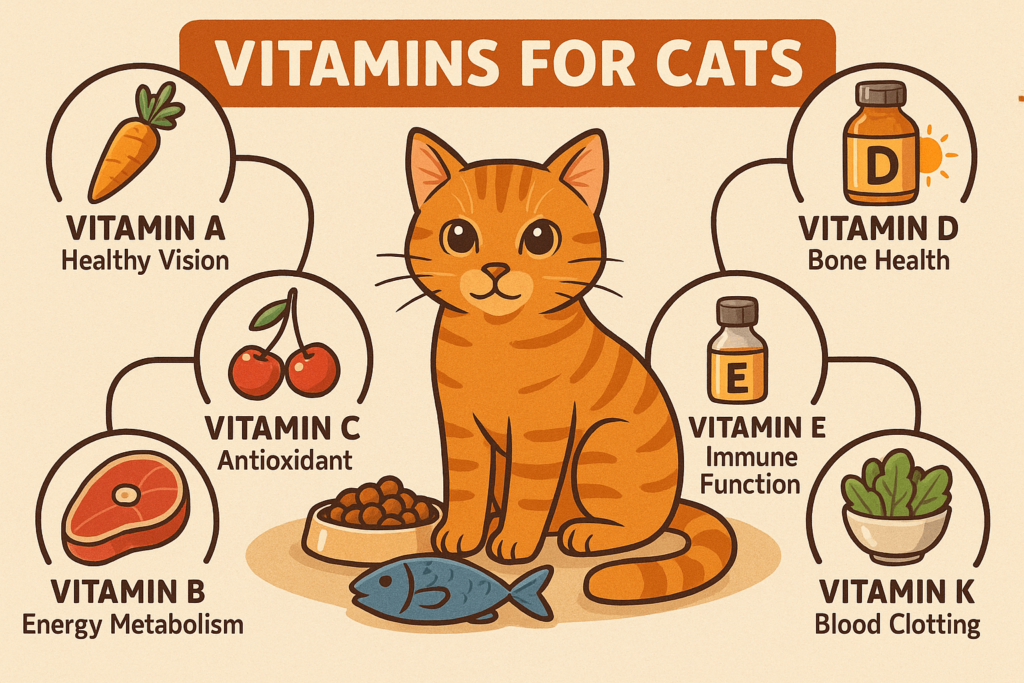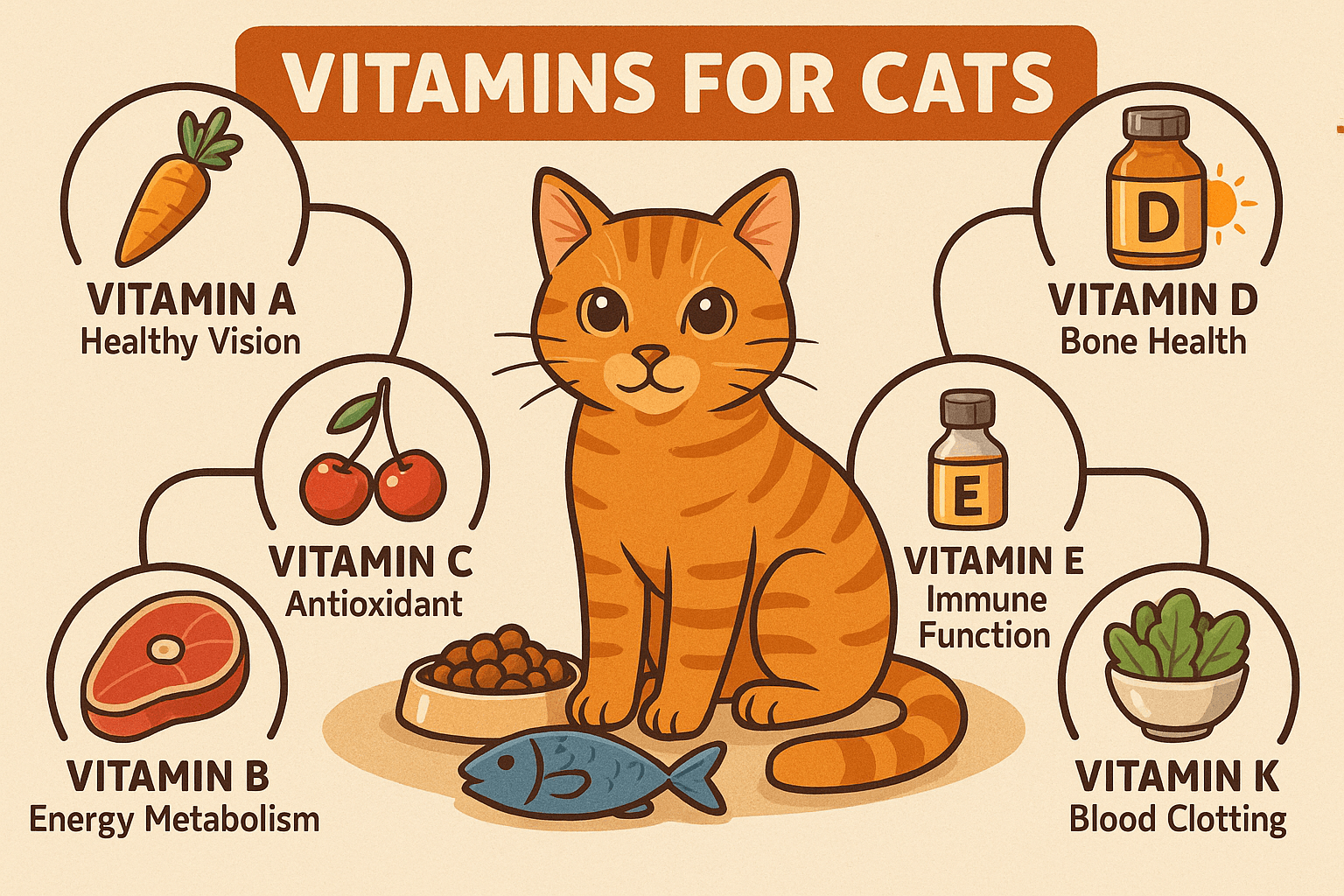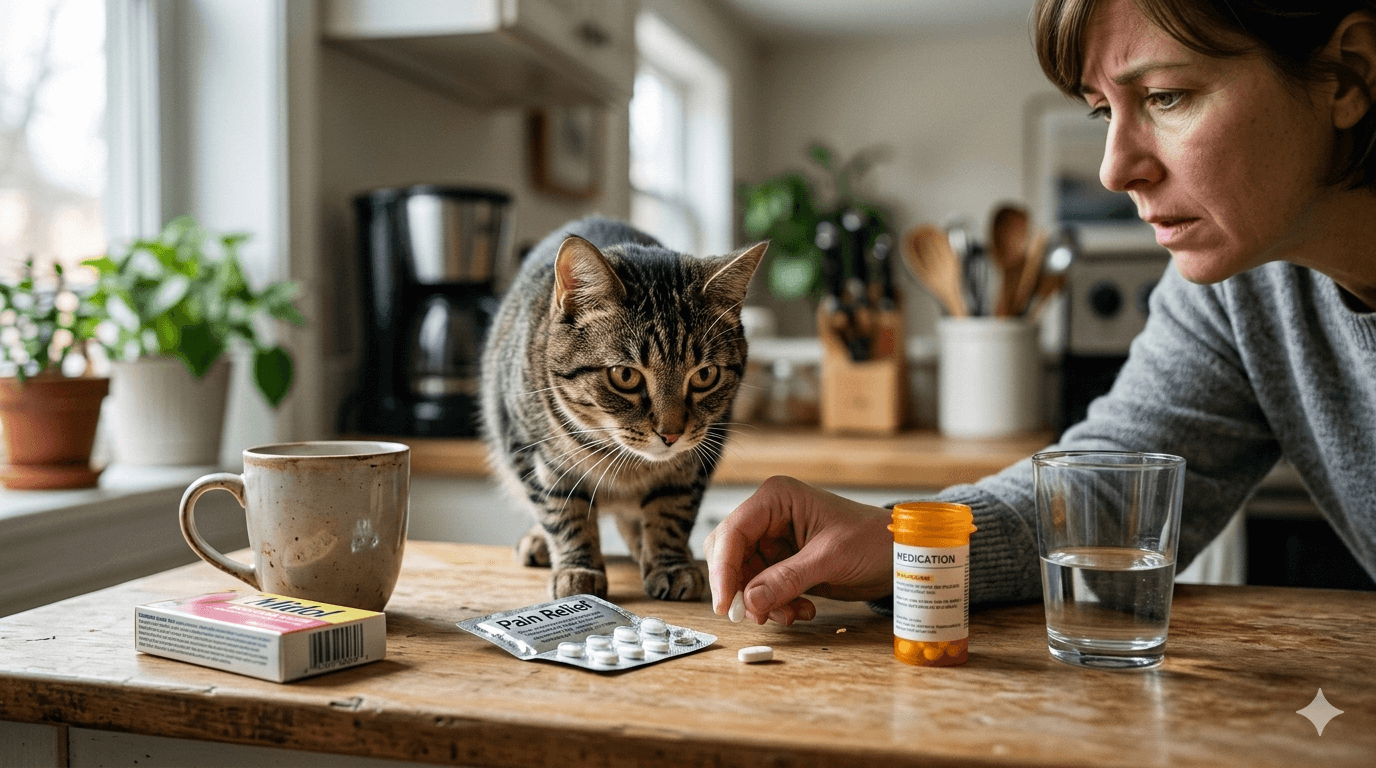Vitamins for Cats: Are They Necessary?
Just like humans, cats require a balanced diet rich in essential nutrients to thrive. While high-quality cat food typically provides most of the vitamins and minerals they need, certain situations may call for additional supplementation. Whether your cat is aging, recovering from illness, or simply needs a nutritional boost, understanding the role of vitamins can help you make informed decisions about their health. In this blog post, we’ll explore the importance of vitamins for cats, which ones are crucial, and how to ensure your feline friend gets the nutrients they need to live a happy, healthy life.
Essential Vitamins for Cats and Their Benefits
Cats rely on specific vitamins to support their overall health, from maintaining strong bones to boosting their immune system. Here’s a breakdown of the most important vitamins and what they do for your furry companion.
Vitamin A:
Essential for vision, skin health, and immune function. Unlike humans, cats cannot convert beta-carotene into vitamin A, so they need it pre-formed in their diet.Vitamin B Complex (B1, B6, B12):
Supports energy metabolism, brain function, and red blood cell production. A deficiency can lead to lethargy or neurological issues.Vitamin C:
Although cats produce their own vitamin C, supplementing may help reduce inflammation and support recovery during illness or stress.Vitamin D:
Crucial for calcium absorption and bone health. Without enough vitamin D, cats are at risk of developing weak or brittle bones.Vitamin E:
Acts as an antioxidant, protecting cells from damage and supporting healthy skin and coat.
These vitamins play vital roles in your cat’s well-being, and ensuring they receive adequate amounts can prevent deficiencies and promote longevity.

Signs Your Cat May Need Vitamin Supplements
While a balanced diet should meet most of your cat’s nutritional needs, there are signs that indicate they might benefit from additional vitamins. Recognizing these symptoms early can help you address potential deficiencies promptly.
Dull or Flaky Coat:
A lackluster coat or excessive shedding may signal a deficiency in vitamins like A or E, which are essential for skin and fur health.Lethargy or Weakness:
Low energy levels could indicate a shortage of B vitamins, which are critical for energy production and metabolism.Frequent Illnesses:
A weakened immune system may result from insufficient vitamin C or other antioxidants that protect against infections.Brittle Bones or Joint Pain:
Symptoms like limping or difficulty jumping may point to a vitamin D or calcium deficiency affecting bone density.Poor Appetite or Weight Loss:
Nutritional imbalances often manifest as changes in eating habits, signaling the need for dietary adjustments or supplements.
If you notice any of these signs, consult your veterinarian to determine whether vitamin supplementation is necessary.
Check this guide 👉Understanding Cat Food Macros: Best 7 Expert Tips!
Check this guide 👉Wet Food vs Dry Cat Food: Best 7 Expert Tips!
Check this guide 👉What Can Cats Eat Besides Cat Food? Best 7 Expert Tips!
Key Vitamins for Cats | Food Sources Rich in These Vitamins |
|---|---|
Vitamin A | Liver, fish oil, eggs |
B Vitamins (B1, B6, B12) | Meat, poultry, dairy products |
Vitamin C | Synthesized naturally by cats |
Vitamin D | Fish, egg yolks, fortified foods |
Vitamin E | Nuts, seeds, leafy greens |
How to Safely Provide Vitamins for Your Cat
Supplementing your cat’s diet with vitamins requires caution, as too much of certain nutrients can be harmful. Follow these guidelines to ensure safe and effective supplementation.
Consult Your Veterinarian First:
Always seek professional advice before introducing new supplements to avoid over-supplementation or adverse reactions.Choose High-Quality Products:
Opt for supplements specifically formulated for cats, as human-grade vitamins may contain unsafe ingredients or dosages.Follow Recommended Dosages:
Stick to the prescribed dosage to prevent toxicity, especially with fat-soluble vitamins like A, D, and E, which can accumulate in the body.Monitor Your Cat’s Response:
Watch for improvements in their health or any negative side effects after starting supplementation. Adjustments may be needed based on their reaction.Combine Supplements with a Balanced Diet:
Supplements should complement—not replace—a nutritionally complete diet. Ensure your cat’s primary food meets their basic needs.
By taking these precautions, you can safely enhance your cat’s health without risking harm.
Common Misconceptions About Cat Vitamins
Despite growing awareness about pet nutrition, misconceptions about vitamins for cats persist. Clearing up these myths ensures you make informed decisions about your cat’s care.
All Cats Need Daily Supplements:
Most cats get sufficient nutrients from high-quality commercial diets, making daily supplements unnecessary unless recommended by a vet.Human Vitamins Are Safe for Cats:
Many human vitamins contain ingredients toxic to cats, such as xylitol or excessive doses of certain nutrients.More Vitamins Mean Better Health:
Over-supplementation can lead to toxicity, particularly with fat-soluble vitamins, which are stored in the body.Homemade Diets Provide Enough Nutrition:
Homemade meals often lack the precise balance of nutrients found in commercial cat foods, increasing the risk of deficiencies.Supplements Cure All Health Issues:
While vitamins support overall health, they cannot replace medical treatment for underlying conditions.
Understanding these truths helps you prioritize your cat’s health without falling prey to misinformation.
Signs of Vitamin Toxicity in Cats
Over-supplementation can harm your cat’s health, so it’s important to recognize the signs of vitamin toxicity. Early detection allows for prompt intervention and prevents serious complications.
Vomiting and Diarrhea:
Gastrointestinal upset is a common symptom of vitamin overdose, especially with water-soluble vitamins like B-complex.Loss of Appetite:
Cats may refuse food if they’re experiencing discomfort or nausea due to excessive vitamin intake.Weakness or Lethargy:
Fatigue and reduced activity levels can indicate toxicity, particularly from fat-soluble vitamins like A or D.Bone Deformities:
Excess vitamin D can lead to calcification of soft tissues, while too much vitamin A may cause skeletal abnormalities.Jaundice or Yellowing of Skin:
This can occur with severe liver damage caused by prolonged over-supplementation.
Being aware of these symptoms helps you act quickly to protect your cat’s health.
Natural Ways to Boost Your Cat’s Vitamin Intake
Incorporating nutrient-rich foods into your cat’s diet can provide a natural source of essential vitamins. Here are some safe options to consider.
Cooked Eggs:
Eggs are rich in vitamin A and protein, but always serve them cooked to avoid salmonella risks.Small Amounts of Cooked Fish:
Fish like salmon or tuna contains omega-3 fatty acids and vitamin D, promoting skin and coat health.Pumpkin Puree:
Rich in fiber and vitamins, pumpkin supports digestive health and can be mixed into your cat’s food.Lean Meats:
Chicken or turkey provides B vitamins and protein, essential for energy and muscle maintenance.Fortified Commercial Foods:
Many high-quality cat foods are enriched with vitamins, offering a convenient way to meet their needs.
These natural additions can enhance your cat’s diet without relying solely on supplements.
The Role of Probiotics in Feline Nutrition
Probiotics work alongside vitamins to support your cat’s digestive and immune systems. Understanding their benefits can further improve your cat’s overall wellness.
Improved Digestion:
Probiotics help break down food more efficiently, reducing issues like bloating or constipation.Enhanced Immune Function:
A healthy gut microbiome strengthens the immune system, helping your cat fight off infections.Reduced Allergy Symptoms:
Probiotics may alleviate symptoms of food sensitivities or environmental allergies in cats.Better Nutrient Absorption:
By improving gut health, probiotics ensure your cat absorbs vitamins and minerals more effectively.Stress Relief During Changes:
Adding probiotics during stressful events, like moving or boarding, can stabilize your cat’s digestive system.
Incorporating probiotics into your cat’s routine complements their vitamin intake for optimal health.
Frequently Asked Questions About Vitamins for Cats
Can I give my cat human multivitamins?
No, human vitamins often contain ingredients toxic to cats. Always use products specifically designed for felines.
How do I know if my cat has a vitamin deficiency?
Look for signs like poor coat condition, lethargy, or frequent illnesses, and consult your vet for a proper diagnosis.
Are vitamin supplements safe for kittens?
Kittens have unique nutritional needs. Consult your vet before giving them any supplements to avoid potential harm.
What happens if my cat consumes too many vitamins?
Over-supplementation can lead to toxicity, causing symptoms like vomiting, diarrhea, or organ damage.
Can older cats benefit from vitamins?
Senior cats may benefit from targeted supplements to support joint health, immunity, or digestion, but only under veterinary guidance.
Prioritizing Your Cat’s Nutritional Health
Providing your cat with the right vitamins is a simple yet powerful way to support their overall health and happiness. By understanding their unique nutritional needs, recognizing signs of deficiencies, and consulting your veterinarian, you can ensure your feline friend thrives. Remember, a balanced diet is the foundation of good health, and supplements should only be used when necessary. With proper care and attention, you can help your cat enjoy a long, vibrant life filled with purrs and playful moments.
Can I Give My Cat Midol? Best 7 Expert Tips! – Learn the risks, symptoms, and safe alternatives to keep your cat healthy and avoid toxic reactions.
Can I Give My Dog Midol? Best 7 Expert Tips! – Discover the risks, safe alternatives, and expert advice to keep your dog safe from accidental poisoning.
Maximum Weight for Cats on Planes: Best 7 Expert Tips! – Learn airline policies, tips to stay compliant, and ensure safe travels for your feline friend.
Max Weight for Dogs on Planes: Best 7 Expert Tips! – Discover airline weight limits, safe travel tips, and solutions for flying with your dog stress-free.





